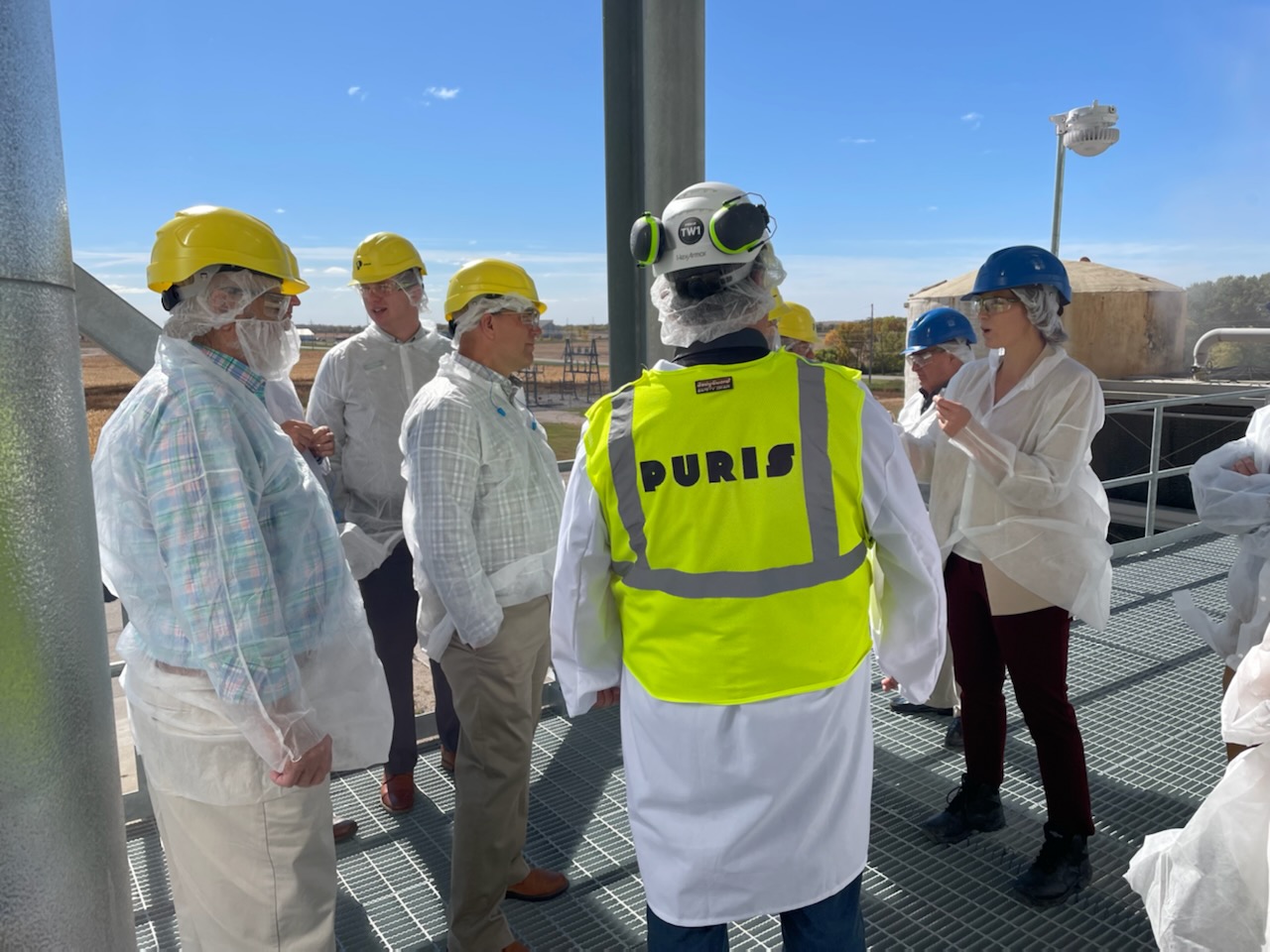A vision of sustainable agriculture from Gnometown, USA

Events like this recent tour at PURIS bring together the players who are coming up with agricultural solutions that move us toward clean water and farm prosperity.
The streetlights in downtown Dawson, Minnesota bear flags proclaiming this to be "Gnometown, USA," a self-declared title that dates back to 1988. And while it's true you can still find the curious little creatures (well, figurines of them) all over the place, these days, the city could easily stake another claim: pea protein hub of North America.
It's all thanks to the west-central Minnesota town's flagship industrial center, a state-of-the-art pea processing facility owned by PURIS. The fortunes of this plant-based protein company are on the rise — and along with them, so are the prospects for a new kind of river-friendly agriculture in the Upper Midwest.
This possible future is what brought area lawmakers to Dawson last month, with PURIS — in partnership with both FMR and Minnesota Environmental Partnership — hosting the legislators for a factory tour and roundtable discussion of clean-water crops. Sen. Gary Dahms, a Republican from Redwood Falls who was the lead sponsor of last session's Forever Green funding package, attended the event. Also present were state Reps. Tim Miller (R-Prinsburg) and Chris Swedzinski (R-Ghent), plus district staff for U.S. Rep. Michelle Fischbach and others interested in growing the sustainable agriculture industry.
Pea protein and clean-water crops
PURIS, a family-run company that specializes in making food ingredients using pea protein, was born at a time when the term "meat alternative" was met with blank stares. No longer: consumer interest in plant-based protein has exploded over the last decade, justifying a $100 million investment from Cargill that helped PURIS purchase and retrofit the facility in Dawson as part of a larger expansion.
Readers may be familiar with winter oilseeds, as well as FMR's broader belief in the potential of these types of clean-water crops and the concept of continuous living cover agriculture. Much of our work has focused on advancements made by the University of Minnesota's Forever Green Initiative, where researchers are rolling out a suite of clean-water crops whose living roots protect the soil even in the harsh winter months. But FMR is just as interested in other endeavors that produce and utilize such crops, including PURIS' decades-long independent research and design efforts around winter peas.
In her remarks to the assembled legislators at last month's event, Dr. Nicole Atchison, CEO of PURIS Holdings, spoke of her company's interest in exploring diverse crop rotations such as peas and winter oilseeds, which would have the double benefit of improving environmental outcomes while boosting farmer profits.
Dr. Don Wyse and Mitch Hunter, both leaders within the Forever Green Initiative, shared the news with event attendees that the biggest players in global agriculture are showing intense interest in the winter oilseeds their teams are developing, spurred in large part by incentives for sustainable fuels that were baked into the federal Inflation Reduction Act.
What does this all add up to? In short, we believe there is now the very real potential to deploy these clean-water crops on millions of acres of land in Minnesota alone in the years ahead.
How we're helping to expand the field
PURIS is a growing success story, but we'll need more to follow in that company's footsteps if we want to make continuous living cover a reality across the region.
Friends of the Mississippi River would consider it something of a hollow victory if we diversify croplands without simultaneously diversifying the social landscape of the agriculture sector. Pursuing a new approach and new crops allows us to put a thumb on the scale, so to speak, as we seek to build more equitable systems.
This idea is built into our work: One of our major successes in the last state legislative session was the creation of a new value chain development grants program. This will provide public funding for new and emerging companies that manufacture products, process seed or otherwise contribute to the growth of continuous living cover enterprises. (After all, without markets and end-users, who can farmers sell to?)
We've been working with our partners at the Minnesota Department of Agriculture to launch the pilot stage of this program, which is due to begin distributing grants early in 2023. This type of early investment often means the difference between success and failure for small businesses, and this program will help to strengthen more links of the value chain.
We also know we can't rest on our laurels, which is why we'll be going back to the Legislature in 2023 in hopes of getting another infusion of capital. As always, stay tuned for ways you can help.
Become a River Guardian
Sign up and we'll email you when important river issues arise. We make it quick and easy to contact decision-makers. River Guardians are also invited to special social hours and other events about legislative and metro river corridor issues.